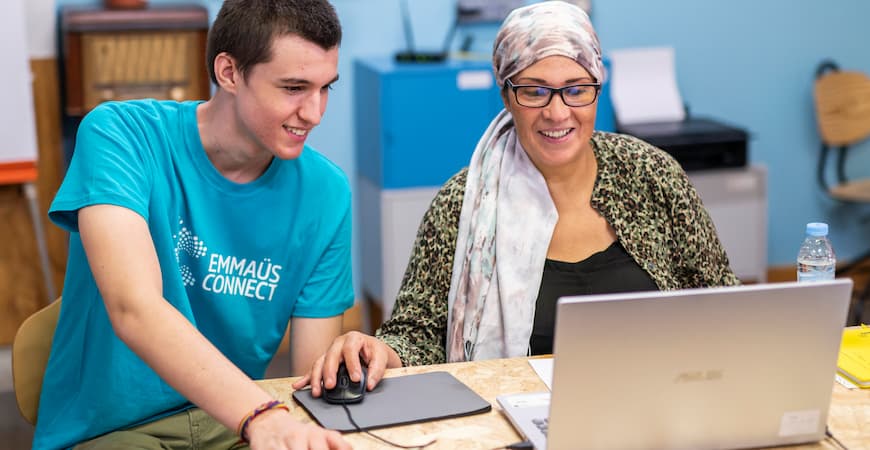Tackling digital exclusion
Further afield in Europe with Emmaus Connect
Emmaus Connect is a French group created in 2013, which promotes digital inclusion for people experiencing social and digital exclusion. We met up with Lilan Criscuolo, who is in charge of international partnerships, to hear what she has to say about future plans for Europe.
After expanding rapidly in France (where the organisation is active in 18 areas, has 12 drop-in centres and has helped more than 137,000 people), in 2023 Emmaus Connect decided to explore the possibility of developing this type of activity in Europe, in partnership with Emmaus groups wherever possible.
Lilan, can you tell us how the idea of extending this project to other countries came about, and what steps have been taken?
Over the last ten years, Emmaus Connect has developed expertise in digital inclusion, focusing primarily on the situation in France. Yet given the major challenges in Europe (42% of citizens lack basic digital skills, even though they are essential in over 90% of jobs), we wanted to explore the issue of digital exclusion in other countries.
Moreover, one of the key missions of Emmaus Connect is to help social work services meet the challenges of digital inclusion – in France, we have trained 13,000 social workers and equipped 500 social welfare facilities. We decided to pursue this approach as part of a Europe-wide project.
This is how our partnership project got off the ground at a European level. The aim was to improve our knowledge of the challenges in other countries affected by the digital divide, while meeting actors and drawing inspiration from good practices, along with sharing our experiences.
In 2023, we launched a training project for social workers, with support from the Erasmus+ programme, in collaboration with Emmaus Satu Mare in Romania and Liberittutti, a social cooperative in Italy.
What are the results of this project?
In 2023, our three organisations worked together to reach several objectives. A field study was conducted on the obstacles to using digital technology in Romania and Italy, both for people experiencing exclusion and social welfare organisations. As a result, each partner was able to better understand the specific challenges in their own country, identify local initiatives and even extend their network of partners to facilitate the inclusion of the target groups.
New professional training modules were developed by Emmaus Connect and were successfully tested by 19 social workers in Turin (Italy) and Satu Mare (Romania). These professionals were informed about the challenges of digital poverty, trained on how to adapt teaching resources and taught the basics of designing workshops.
Having achieved our training objective of the social initiative, we are now focusing on sharing the results of the project, in the hope that they will benefit other non-profit organisations and social welfare services, in order to improve digital support for the most vulnerable members of society.
So, what’s next?
Through this project, various social and environmental issues linked to digital technology have been identified, paving the way for new initiatives.
A number of possible projects have emerged: continuing to train social workers to support people experiencing exclusion, facilitating access to high quality educational content and pedagogical resources, bolstering access to digital hardware through the collection and re-use of equipment, and even tackling tomorrow’s digital inclusion issues, such as digital citizenship.
On the strength of this initial experience, we would like to respond to these challenges together with other Emmaus groups, to facilitate the sharing of expertise and exchanges of good practices, while taking action on a large enough scale to help bridge the digital divide across Europe.
For further information, visit https://emmaus-connect.org/

© Emmaus Connect



